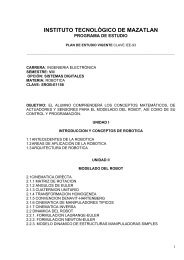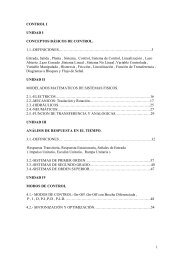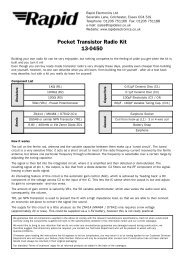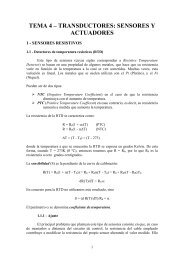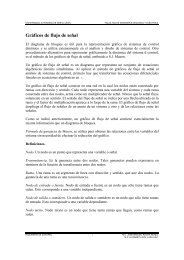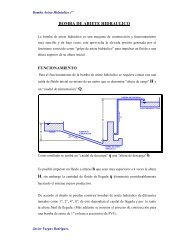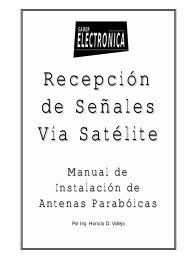- Page 2 and 3:
SOCIALLY INTELLIGENT AGENTSCreating
- Page 4 and 5:
SOCIALLY INTELLIGENT AGENTSCreating
- Page 6 and 7:
ContentsContributing Authors1Social
- Page 8 and 9:
Contents21Experiences with Sparky,
- Page 10 and 11:
Contributing AuthorsAude BillardCom
- Page 12 and 13:
Contributing AuthorsxiPeyman Farati
- Page 14 and 15:
Contributing AuthorsxiiiBernard Ogd
- Page 16:
Contributing AuthorsxvNell TenhaafD
- Page 19 and 20:
2 Socially Intelligent AgentsFigure
- Page 21 and 22:
4 Socially Intelligent AgentsFigure
- Page 23 and 24:
6 Socially Intelligent Agentsthe ag
- Page 25 and 26:
8 Socially Intelligent AgentsThis r
- Page 27 and 28:
10 Socially Intelligent Agentstrack
- Page 29 and 30:
12 Socially Intelligent Agentsintel
- Page 31 and 32: 14 Socially Intelligent Agentsof a
- Page 33 and 34: 16 Socially Intelligent AgentsIn ch
- Page 35 and 36: 18 Socially Intelligent AgentsFigur
- Page 37 and 38: 20 Socially Intelligent Agents[8] P
- Page 39 and 40: 22 Socially Intelligent Agentscontr
- Page 42 and 43: Understanding Social Intelligence 2
- Page 44 and 45: Understanding Social Intelligence 2
- Page 46 and 47: Chapter 3MODELING SOCIAL RELATIONSH
- Page 48 and 49: Modeling Social Relationship 31soci
- Page 50 and 51: Modeling Social Relationship 33Figu
- Page 52 and 53: Modeling Social Relationship 35seco
- Page 54 and 55: Chapter 4DEVELOPING AGENTS WHO CANR
- Page 56 and 57: Developing Agents Who Can Relate to
- Page 58 and 59: Developing Agents Who Can Relate to
- Page 60 and 61: Developing Agents Who Can Relate to
- Page 62 and 63: Chapter 5PARTY HOSTS AND TOUR GUIDE
- Page 64 and 65: Party Hosts and Tour Guides 47conve
- Page 66 and 67: Party Hosts and Tour Guides 492.2 E
- Page 68 and 69: Party Hosts and Tour Guides 514. Co
- Page 70 and 71: Chapter 6INCREASING SIA ARCHITECTUR
- Page 72 and 73: Adapting to Affect and Personality
- Page 74 and 75: Adapting to Affect and Personality
- Page 76 and 77: Adapting to Affect and Personality
- Page 78 and 79: Chapter 7COOPERATIVE INTERFACE AGEN
- Page 80 and 81: Cooperative Interface Agents 63cult
- Page 84 and 85: Cooperative Interface Agents 67make
- Page 86 and 87: Chapter 8PLAYING THE EMOTION GAME W
- Page 88 and 89: Playing the Emotion Game with Feeli
- Page 90 and 91: Playing the Emotion Game with Feeli
- Page 92 and 93: Playing the Emotion Game with Feeli
- Page 94 and 95: Chapter 9CREATING EMOTION RECOGNITI
- Page 96 and 97: Emotion Recognition Agents for Spee
- Page 98 and 99: Emotion Recognition Agents for Spee
- Page 100 and 101: Emotion Recognition Agents for Spee
- Page 102 and 103: Chapter 10SOCIAL INTELLIGENCE FOR C
- Page 104 and 105: Social Intelligence for Computers 8
- Page 106 and 107: Social Intelligence for Computers 8
- Page 108 and 109: Social Intelligence for Computers 9
- Page 110 and 111: Chapter 11EGOCHAT AGENTA Talking Vi
- Page 112 and 113: EgoChat Agent 95that members in a g
- Page 114 and 115: EgoChat Agent 97virtualized-ego(A)v
- Page 116 and 117: EgoChat Agent 99apply EgoChat to a
- Page 118 and 119: Chapter 12ELECTRIC ELVESAdjustable
- Page 120 and 121: Electric Elves 103user in the agent
- Page 122 and 123: Electric Elves 105The delay MDP rea
- Page 124 and 125: Electric Elves 107intervening, lead
- Page 126 and 127: Chapter 13BUILDING EMPIRICALLY PLAU
- Page 128 and 129: Building Empirically Plausible MAS
- Page 130 and 131: Building Empirically Plausible MAS
- Page 132 and 133:
Building Empirically Plausible MAS
- Page 134 and 135:
Chapter 14ROBOTIC PLAYMATESAnalysin
- Page 136 and 137:
Analysing Interactive Competencies
- Page 138 and 139:
Analysing Interactive Competencies
- Page 140 and 141:
Analysing Interactive Competencies
- Page 142 and 143:
Chapter 15MOBILE ROBOTIC TOYS AND A
- Page 144 and 145:
Mobile Robotic Toys and Autism 127m
- Page 146 and 147:
Mobile Robotic Toys and Autism 129F
- Page 148 and 149:
Mobile Robotic Toys and Autism 131p
- Page 150 and 151:
Chapter 16AFFECTIVE SOCIAL QUESTEmo
- Page 152 and 153:
Affective Social Quest 135Figure 16
- Page 154 and 155:
Affective Social Quest 137tion is t
- Page 156 and 157:
Affective Social Quest 139parents w
- Page 158 and 159:
Chapter 17PEDAGOGICAL SOAPSocially
- Page 160 and 161:
Pedagogical Soap 1432. IPD Backgrou
- Page 162 and 163:
Pedagogical Soap 145EmotionalApprai
- Page 164 and 165:
Pedagogical Soap 147trol their chil
- Page 166 and 167:
Chapter 18DESIGNING SOCIABLE MACHIN
- Page 168 and 169:
Designing Sociable Machines 151Sens
- Page 170 and 171:
Designing Sociable Machines 153crit
- Page 172 and 173:
Designing Sociable Machines 155qual
- Page 174 and 175:
Chapter 19INFANOIDA Babybot that Ex
- Page 176 and 177:
Infanoid 159— are arranged in a 4
- Page 178 and 179:
Infanoid 161subset of the environme
- Page 180 and 181:
Infanoid 163To explain the origin o
- Page 182 and 183:
Chapter 20PLAY, DREAMS AND IMITATIO
- Page 184 and 185:
Play, Dreams and Imitation in Robot
- Page 186 and 187:
Play, Dreams and Imitation in Robot
- Page 188 and 189:
Play, Dreams and Imitation in Robot
- Page 190 and 191:
Chapter 21EXPERIENCES WITH SPARKY,
- Page 192 and 193:
Experiences with Sparky, a Social R
- Page 194 and 195:
Experiences with Sparky, a Social R
- Page 196 and 197:
Experiences with Sparky, a Social R
- Page 198 and 199:
Chapter 22SOCIALLY SITUATED PLANNIN
- Page 200 and 201:
Socially Situated Planning 183will
- Page 202 and 203:
Socially Situated Planning 185chang
- Page 204 and 205:
Socially Situated Planning 187of pl
- Page 206 and 207:
Chapter 23DESIGNING FOR INTERACTION
- Page 208 and 209:
Designing for Interaction 191force
- Page 210 and 211:
Designing for Interaction 193ment b
- Page 212 and 213:
Designing for Interaction 195ductio
- Page 214 and 215:
Chapter 24ME, MY CHARACTER AND THE
- Page 216 and 217:
Me, My Character and the Others 199
- Page 218 and 219:
Me, My Character and the Others 201
- Page 220 and 221:
Me, My Character and the Others 203
- Page 222 and 223:
Chapter 25FROM PETS TO STORYROOMSCo
- Page 224 and 225:
From PETS to StoryRooms 2074. A Sto
- Page 226 and 227:
From PETS to StoryRooms 209realized
- Page 228 and 229:
From PETS to StoryRooms 211own Stor
- Page 230 and 231:
Chapter 26SOCIALLY INTELLIGENT AGEN
- Page 232 and 233:
Socially Intelligent Agents in Educ
- Page 234 and 235:
Socially Intelligent Agents in Educ
- Page 236 and 237:
Socially Intelligent Agents in Educ
- Page 238 and 239:
Chapter 27TOWARDS INTEGRATING PLOT
- Page 240 and 241:
Towards Integrating Plot and Charac
- Page 242 and 243:
Towards Integrating Plot and Charac
- Page 244 and 245:
Towards Integrating Plot and Charac
- Page 246 and 247:
Chapter 28THE COOPERATIVE CONTRACTI
- Page 248 and 249:
The Cooperative Contract 231relies
- Page 250 and 251:
The Cooperative Contract 233To supp
- Page 252 and 253:
Chapter 29PERCEPTIONS OF SELF IN AR
- Page 254 and 255:
Perceptions of Self 237semination o
- Page 256 and 257:
Perceptions of Self 239Figure 29.1.
- Page 258 and 259:
Perceptions of Self 241human senses
- Page 260 and 261:
Chapter 30MULTI-AGENT CONTRACT NEGO
- Page 262 and 263:
Multi-Agent Contract Negotiation 24
- Page 264 and 265:
Multi-Agent Contract Negotiation 24
- Page 266 and 267:
Multi-Agent Contract Negotiation 24
- Page 268 and 269:
Chapter 31CHALLENGES IN AGENT BASED
- Page 270 and 271:
Challenges in ABSS of Negotiation 2
- Page 272 and 273:
Challenges in ABSS of Negotiation 2
- Page 274 and 275:
Challenges in ABSS of Negotiation 2
- Page 276 and 277:
Chapter 32ENABLING OPEN AGENT INSTI
- Page 278 and 279:
Enabling Open Agent Institutions 26
- Page 280 and 281:
Enabling Open Agent Institutions 26
- Page 282 and 283:
Enabling Open Agent Institutions 26
- Page 284 and 285:
Chapter 33EMBODIED CONVERSATIONAL A
- Page 286 and 287:
ECA’s In E-Commerce Applications
- Page 288 and 289:
ECA’s In E-Commerce Applications
- Page 290 and 291:
ECA’s In E-Commerce Applications
- Page 292 and 293:
Index"like-me" test 85,89“Giant3
- Page 294 and 295:
INDEX 277educational computer games
- Page 296 and 297:
INDEX 279mutual selection 243mutual
- Page 298:
INDEX 281theory of dramatic writing



